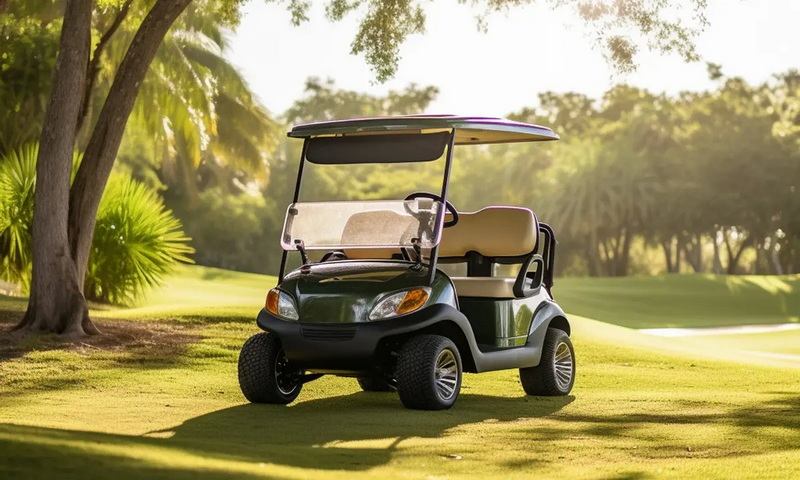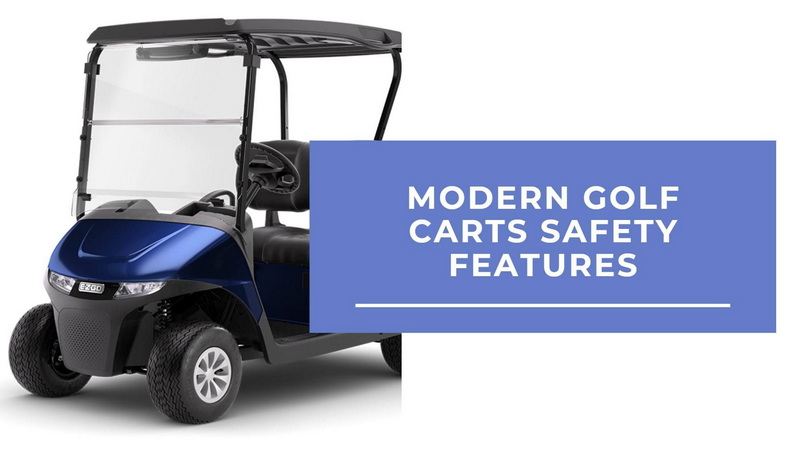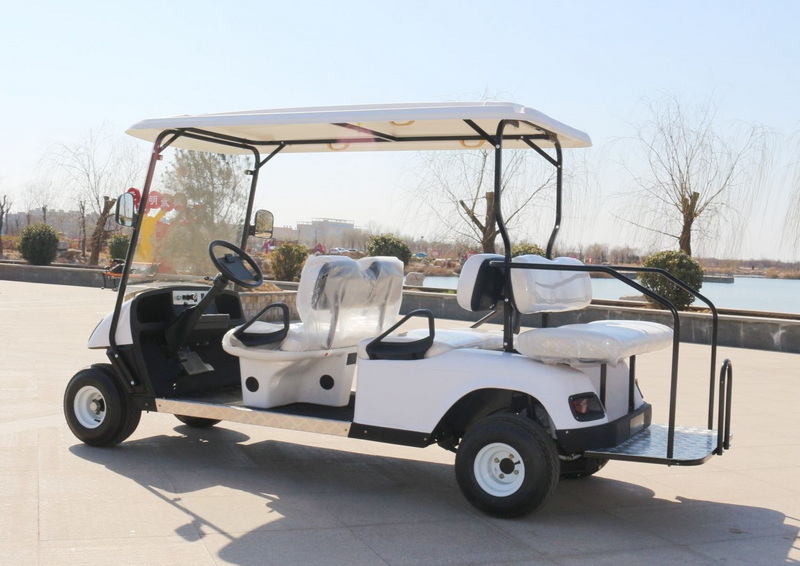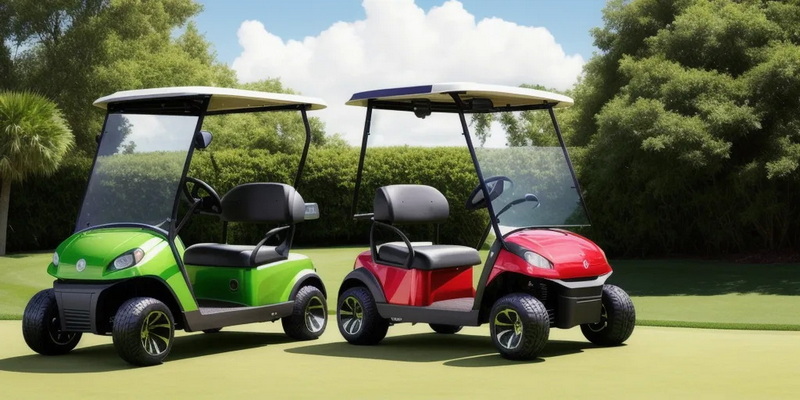Content Menu
● Understanding Electric Golf Cart Mechanics
>> Motor and Power System
>> Transmission and Gearing
>> Weight Distribution
● Factors Affecting Climbing Ability
>> Motor Power
>> Battery Capacity and Charge
>> Weight and Load
>> Tire Traction
>> Terrain Surface
● Typical Climbing Capabilities
>> Safety Considerations
● Enhancing Climbing Performance
>> High-Torque Motors
>> Lithium-Ion Battery Upgrade
>> Gear Ratio Adjustment
>> Tire Upgrades
>> Weight Reduction
● Real-World Performance Examples
>> Standard Golf Course Application
>> Residential Community Use
>> Off-Road and Trail Use
● Testing and Measuring Slope Capability
>> Inclinometer Method
>> Controlled Environment Testing
>> GPS-Based Elevation Tracking
● Environmental Impact and Energy Efficiency
>> Reduced Emissions
>> Energy Recuperation
>> Efficiency on Inclines
● Future Developments
>> Advanced Motor Technologies
>> Smart Traction Control
>> Lightweight Materials
● Conclusion
● Frequently Asked Questions (FAQ)
>> 1. What is the maximum slope an average electric golf cart can climb?
>> 2. How does the weight of passengers affect a golf cart's climbing ability?
>> 3. Can I modify my electric golf cart to climb steeper hills?
>> 4. How do weather conditions affect an electric golf cart's performance on slopes?
>> 5. Are there any safety precautions I should take when driving an electric golf cart on steep inclines?
Electric golf carts have become increasingly popular not only on golf courses but also in various other settings, such as resorts, campuses, and residential communities. One of the most common questions that arise when considering the use of electric golf carts is their ability to handle steep inclines. In this comprehensive article, we'll explore the climbing capabilities of electric golf carts, factors that affect their performance on slopes, and provide valuable insights for golf cart owners and enthusiasts.

Understanding Electric Golf Cart Mechanics
Before delving into the specifics of how steep an electric golf cart can climb, it's essential to understand the basic mechanics of these vehicles.
Motor and Power System
Electric golf carts are powered by electric motors, typically ranging from 3 to 5 horsepower. These motors draw energy from a set of batteries, usually 6 to 8 six-volt batteries connected in series to provide 36 or 48 volts of power. The motor's power output directly influences the cart's ability to climb steep inclines.
Transmission and Gearing
Most electric golf carts use a simple direct drive system with a single-speed transmission. This design provides a good balance between low-speed torque for climbing and reasonable top speed for flat terrain. Some higher-end models may feature multi-speed transmissions or electronic speed controllers for improved performance.
Weight Distribution
The weight distribution of an electric golf cart plays a crucial role in its climbing ability. The batteries, which are typically located under the seat or in the rear of the cart, contribute significantly to the overall weight and can affect traction and stability on slopes.
Factors Affecting Climbing Ability
Several factors influence how steep an incline an electric golf cart can climb:
Motor Power
The power output of the electric motor is a primary factor in determining climbing ability. More powerful motors can generate greater torque, allowing the cart to tackle steeper slopes.
Battery Capacity and Charge
The state of charge and overall capacity of the batteries affect the cart's performance. A fully charged battery pack will provide more power and better climbing ability than one that's partially depleted.
Weight and Load
The total weight of the cart, including passengers and cargo, impacts its climbing capability. Heavier loads require more power to move uphill, potentially limiting the maximum slope the cart can handle.
Tire Traction
The type and condition of the tires significantly affect a golf cart's ability to climb slopes. Tires with good tread and appropriate inflation provide better grip on inclined surfaces.
Terrain Surface
The surface of the incline plays a role in determining how steep a golf cart can climb. Paved surfaces generally offer better traction than loose gravel or wet grass.

Typical Climbing Capabilities
While the exact climbing ability of an electric golf cart can vary based on the factors mentioned above, most standard electric golf carts are designed to handle slopes of up to 20 degrees or a 36% grade. This is generally sufficient for most golf courses and typical residential or commercial applications.
However, it's important to note that this is not a hard limit, and some carts may be capable of climbing steeper inclines under ideal conditions. Conversely, factors such as wet surfaces, heavy loads, or low battery charge can reduce the maximum slope a cart can safely navigate.
Safety Considerations
When operating an electric golf cart on steep inclines, safety should always be the top priority. Here are some important safety considerations:
- Always approach slopes at a right angle, never diagonally.
- Reduce speed when descending steep hills to maintain control.
- Avoid sudden stops or direction changes on inclines.
- Ensure proper weight distribution and avoid overloading the cart.
- Regularly maintain your golf cart, paying special attention to the brakes and tires.
Enhancing Climbing Performance
For those who frequently encounter steep terrain or require better climbing performance from their electric golf cart, several modifications and upgrades can help:
High-Torque Motors
Upgrading to a more powerful motor with higher torque output can significantly improve a golf cart's climbing ability. Some aftermarket motors are specifically designed for enhanced hill-climbing performance.
Lithium-Ion Battery Upgrade
Replacing traditional lead-acid batteries with lithium-ion batteries can provide more consistent power output and improved performance, especially on inclines.
Gear Ratio Adjustment
Modifying the gear ratio can increase torque at the wheels, improving climbing ability at the expense of top speed on flat ground.
Tire Upgrades
Installing larger tires with aggressive tread patterns can enhance traction on steep or slippery surfaces.
Weight Reduction
Reducing the overall weight of the cart by removing non-essential components or using lighter materials can improve its power-to-weight ratio and climbing performance.
Real-World Performance Examples
To provide a better understanding of electric golf cart climbing capabilities, let's look at some real-world examples:
Standard Golf Course Application
On a typical golf course with moderate slopes, a standard electric golf cart can easily handle most inclines encountered during play. These slopes rarely exceed 15 degrees, well within the capabilities of most carts.
Residential Community Use
In residential communities with steeper roads, such as those built on hillsides, electric golf carts may face more challenging inclines. In these scenarios, carts with upgraded motors or lithium-ion batteries often perform better, handling slopes of up to 25 degrees comfortably.
Off-Road and Trail Use
Some enthusiasts use modified electric golf carts for off-road adventures. These heavily upgraded carts, often featuring high-torque motors, advanced suspension systems, and aggressive tires, can tackle slopes of 30 degrees or more in controlled conditions.
Testing and Measuring Slope Capability
For those interested in determining the exact climbing capability of their electric golf cart, several methods can be employed:
Inclinometer Method
Using a digital inclinometer or smartphone app, you can measure the angle of various slopes and test your cart's performance. Start with gentle inclines and gradually progress to steeper ones, always prioritizing safety.
Controlled Environment Testing
Some golf cart manufacturers and enthusiasts use specially designed ramps or adjustable platforms to test climbing abilities in a controlled environment. This allows for precise measurement of maximum climbing angles under various conditions.
GPS-Based Elevation Tracking
Modern GPS devices and smartphone apps can track elevation changes during a route. By analyzing this data, you can determine the steepest successful climb your cart has achieved in real-world conditions.

Environmental Impact and Energy Efficiency
When considering the climbing ability of electric golf carts, it's also worth noting their environmental impact and energy efficiency:
Reduced Emissions
Electric golf carts produce zero direct emissions, making them an environmentally friendly choice for transportation on slopes and flat terrain alike.
Energy Recuperation
Some advanced electric golf carts feature regenerative braking systems, which can recover energy when descending slopes, slightly extending the cart's range.
Efficiency on Inclines
While climbing steep slopes requires more energy, electric motors are generally more efficient at converting stored energy into motion compared to internal combustion engines, especially at low speeds typically encountered on inclines.
Future Developments
As technology continues to advance, we can expect to see improvements in electric golf cart climbing capabilities:
Advanced Motor Technologies
New motor designs, such as axial flux motors, promise higher power density and improved efficiency, potentially leading to better climbing performance in future golf cart models.
Smart Traction Control
Integration of intelligent traction control systems could optimize power delivery on various surfaces and inclines, enhancing both climbing ability and safety.
Lightweight Materials
The use of advanced lightweight materials in golf cart construction could improve the power-to-weight ratio, resulting in better overall performance, including on steep inclines.
Conclusion
The climbing ability of an electric golf cart depends on various factors, including motor power, battery capacity, weight, and terrain. While most standard carts can handle slopes up to 20 degrees, modifications and upgrades can significantly enhance this capability. As technology advances, we can expect to see electric golf carts with even better climbing abilities in the future.
Whether you're using your electric golf cart on a course, in a residential community, or for off-road adventures, understanding its climbing capabilities and limitations is crucial for safe and efficient operation. By considering the factors discussed in this article and potentially implementing some of the suggested upgrades, you can ensure that your electric golf cart is well-equipped to handle the inclines you encounter.

Frequently Asked Questions (FAQ)
1. What is the maximum slope an average electric golf cart can climb?
Most standard electric golf carts are designed to safely climb slopes of up to 20 degrees or a 36% grade. However, this can vary depending on factors such as the cart's specific model, battery charge, and load.
2. How does the weight of passengers affect a golf cart's climbing ability?
The total weight of passengers and cargo significantly impacts a golf cart's climbing capability. Heavier loads require more power to move uphill, potentially reducing the maximum slope the cart can handle. It's important to stay within the manufacturer's recommended weight limits for optimal performance and safety.
3. Can I modify my electric golf cart to climb steeper hills?
Yes, several modifications can enhance your golf cart's climbing ability. These include upgrading to a more powerful motor, installing lithium-ion batteries, adjusting the gear ratio, upgrading to better tires, and reducing overall weight. However, it's crucial to consult with a professional or the manufacturer before making significant modifications to ensure safety and warranty compliance.
4. How do weather conditions affect an electric golf cart's performance on slopes?
Weather conditions can significantly impact a golf cart's climbing ability. Wet or icy surfaces reduce traction, making it more difficult and potentially dangerous to climb steep inclines. Additionally, extreme temperatures can affect battery performance, with cold weather potentially reducing the cart's power output and climbing capability.
5. Are there any safety precautions I should take when driving an electric golf cart on steep inclines?
When operating an electric golf cart on steep inclines, always approach slopes at a right angle, reduce speed when descending, avoid sudden stops or direction changes, ensure proper weight distribution, and regularly maintain your cart, especially the brakes and tires. It's also advisable to familiarize yourself with the specific terrain and your cart's limitations before attempting to navigate steep slopes.











































